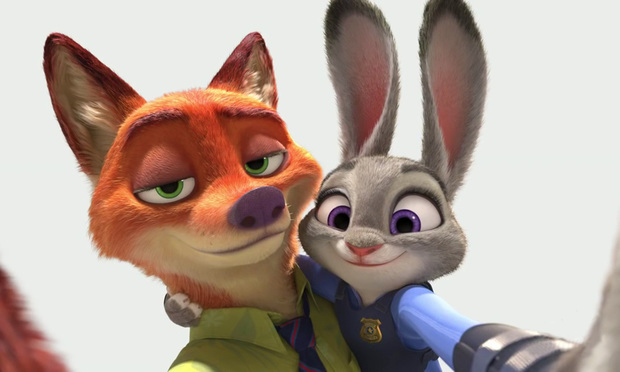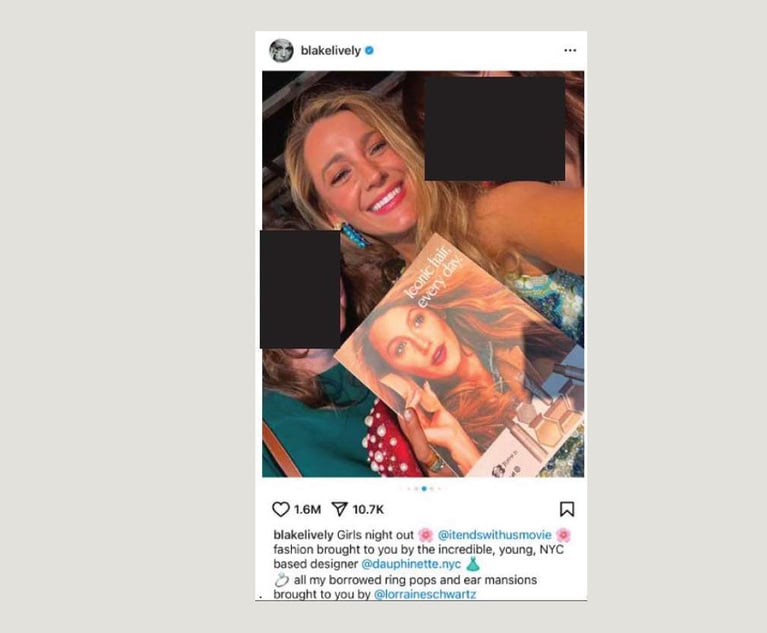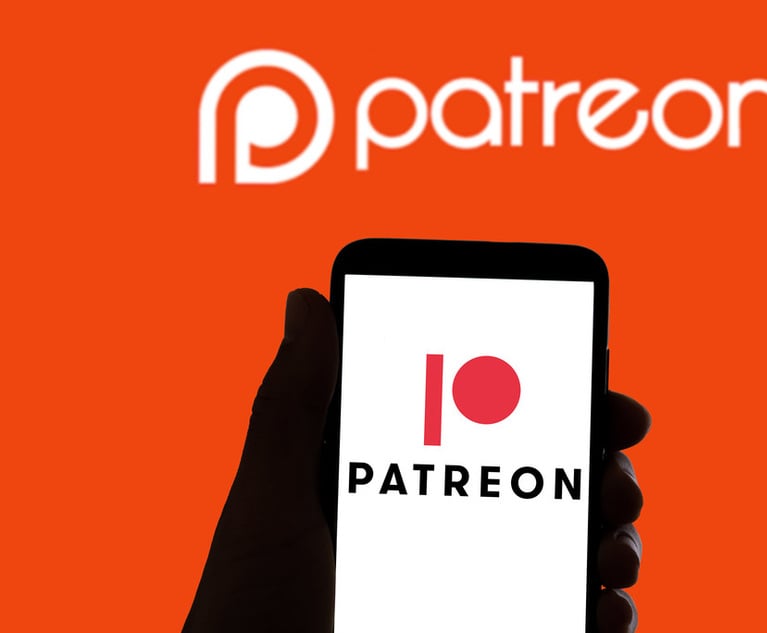Final Cut Hits ‘Zootopia’ Copyright Lawsuit Against Disney
A contrary ruling "would have the peculiar result of giving plaintiff a monopoly over all animated films involving crime-fighting, talking animals," U.S. District Judge Andrew J. Guilford wrote.
August 20, 2019 at 06:42 PM
5 minute read
 Zootopia
Zootopia
A federal judge in California has dismissed a suit against Walt Disney Pictures and others over the alleged authorship of the animated film “Zootopia.”
U.S. District Judge Andrew J. Guilford of the Central District of California on Monday granted a motion for dismissal without leave to amend.
Plaintiff Brian Neil Hoff and Gary L. Goldman’s Esplanade Productions sued Disney, ABC, Buena Vista Home Entertainment and related entities claiming copyright infringement, breach of implied contract, unfair competition, conversion and breach of confidence in connection with the film, which won the Academy Award for best animated feature in 2016.
The court dismissed all five claims, holding that Hoff failed to establish substantial similarity between the two films, and that his implied contract claim was time-barred in California.
In his suit, Hoff alleged that Disney’s Zootopia copied certain copyrighted elements of his original screenplay titled, “Secret Agent 00K9,” or “00K9,” which he wrote in 2007 about various animals—anthropomorphic characters—who follow clues to solve crime. In Hoff’s 00K9, the main character is a dog brought out of retirement.
The court ruled that Zootopia—about a rabbit policewoman named Judy Hopps who partners with a con-artist fox named Nick Wilde to solve a missing-animal crime and defeat a sheep’s mischievous plan to seize political control of Zootopia—lacked “substantial similarity” on many levels, including storyline and character descriptions, that was enough to dismiss Hoff’s claims.
Roger Behle Jr. of Foley Bezek Behle & Curtis in Santa Barbara represented the plaintiffs. Behle was not available for comment.
Drew Breuder of O’Melveney & Myers in Los Angeles represented Disney and the other defendants. Breuder also was not immediately available.
Hoff alleged that sometime after completing 00K9, he contacted Disney and the other defendants to pitch them the project. Hoff claimed he had “numerous” conversations with those defendants and gave them access to his secure website so they could review his screenplay and other material.
Disney passed on 00K9, but in 2016, Disney released Zootopia, which also involved anthropomorphic animals investigating crime, along with related books and other material featuring the characters.
In July 2017, U.S. District Judge Michael Fitzgerald of the Central District of California granted a motion to dismiss, but also granted leave to amend.
On Monday, Guilford, considering the amended suit, noted that the plaintiffs argued that the copyright claim is “governed by a more ‘relaxed’ pleading standard such that plaintiff ‘need not identify similarities or other details of the [alleged] infringement in [his] pleadings.’
“But it’s well established that, in the Ninth Circuit, plaintiff must plausibly allege substantial similarity between the two works to sustain his copyright claim,” Guilford wrote. “The many district court cases plaintiff cites to support a different view all predate the Rentmeester decision and are otherwise unconvincing.”
Hoff’s contention that his burden of showing substantial similarity should be lessened by the substantial access defendants allegedly had to his copyrighted materials ”is at odds with clear Ninth Circuit precedent,” Guilford also said.
The extrinsic test, he said, measures the “objective similarities of the two works, focusing only on the protectable elements of the plaintiff’s expression.” The intrinsic test, on the other hand, “requires a more holistic, subjective comparison of the works to determine whether they are substantially similar in “total concept and feel.”
“Here, defendants argue plaintiff’s copyright claim fails as a matter of law because plaintiff can’t show substantial similarity under the extrinsic test,” wrote Guilford. “The Court agrees,” he said, finding ”insufficient similarity between the two works.”
He added that a contrary ruling “would have the peculiar result of giving plaintiff a monopoly over all animated films involving crime-fighting, talking animals.”
He noted ”no character similarities between 00K9 and Zootopia showing substantial similarity under the extrinsic test.”
The judge also agreed with the defendants’ contention that Hoff’s implied contract claim is time-barred under California’s two-year limitations period for contract claims. “Implied contract claims accrue at the time of the alleged breach. And here, the alleged breach occurred in 2016, when defendants released Zootopia in the United States,” Guilford wrote.
The plaintiffs’ “position depends on a continuing violations theory, which, according to defendants, doesn’t apply to claims for breach of implied,” he added. “In any case, plaintiff’s implied contract claim fails on its merits, too.”
Guilford also agreed that the remaining state law claims for conversion and unfair competition are preempted by the Copyright Act. ”These allegations clearly show plaintiff’s claims for conversion and unfair competition involve the same subject matter and rights as his copyright claim. Consequently, these claims are preempted by the Copyright Act.”
Hoff argued that his conversion claim isn’t preempted because “defendants received an actual tangible item that was never returned to him, his screenplay,” but ”this argument is unconvincing,” the judge said. “Though plaintiff alleges defendants received tangible copies of plaintiff’s screenplay, plaintiff’s conversion claim is, at its core, a claim for copyright infringement.”
Guilford denied leave to amend because he ”has determined, as a matter of law, that 00K9 and Zooptopia aren’t substantially similar.”
This content has been archived. It is available through our partners, LexisNexis® and Bloomberg Law.
To view this content, please continue to their sites.
Not a Lexis Subscriber?
Subscribe Now
Not a Bloomberg Law Subscriber?
Subscribe Now
NOT FOR REPRINT
© 2025 ALM Global, LLC, All Rights Reserved. Request academic re-use from www.copyright.com. All other uses, submit a request to [email protected]. For more information visit Asset & Logo Licensing.
You Might Like
View All
Netflix Music Guru Becomes First GC of Startup Helping Independent Artists Monetize Catalogs
2 minute read
Justin Baldoni Sues Blake Lively and Ryan Reynolds for $400M in New Step in 'It Ends With Us' Fight
6 minute read
Patreon Hit With Lawsuit for Allegedly Diverting Subscriber Data to Meta

Music App Denied Injunction Against Apple Over Alleged Scheme to Block Its Access to App Store
Trending Stories
Who Got The Work
J. Brugh Lower of Gibbons has entered an appearance for industrial equipment supplier Devco Corporation in a pending trademark infringement lawsuit. The suit, accusing the defendant of selling knock-off Graco products, was filed Dec. 18 in New Jersey District Court by Rivkin Radler on behalf of Graco Inc. and Graco Minnesota. The case, assigned to U.S. District Judge Zahid N. Quraishi, is 3:24-cv-11294, Graco Inc. et al v. Devco Corporation.
Who Got The Work
Rebecca Maller-Stein and Kent A. Yalowitz of Arnold & Porter Kaye Scholer have entered their appearances for Hanaco Venture Capital and its executives, Lior Prosor and David Frankel, in a pending securities lawsuit. The action, filed on Dec. 24 in New York Southern District Court by Zell, Aron & Co. on behalf of Goldeneye Advisors, accuses the defendants of negligently and fraudulently managing the plaintiff's $1 million investment. The case, assigned to U.S. District Judge Vernon S. Broderick, is 1:24-cv-09918, Goldeneye Advisors, LLC v. Hanaco Venture Capital, Ltd. et al.
Who Got The Work
Attorneys from A&O Shearman has stepped in as defense counsel for Toronto-Dominion Bank and other defendants in a pending securities class action. The suit, filed Dec. 11 in New York Southern District Court by Bleichmar Fonti & Auld, accuses the defendants of concealing the bank's 'pervasive' deficiencies in regards to its compliance with the Bank Secrecy Act and the quality of its anti-money laundering controls. The case, assigned to U.S. District Judge Arun Subramanian, is 1:24-cv-09445, Gonzalez v. The Toronto-Dominion Bank et al.
Who Got The Work
Crown Castle International, a Pennsylvania company providing shared communications infrastructure, has turned to Luke D. Wolf of Gordon Rees Scully Mansukhani to fend off a pending breach-of-contract lawsuit. The court action, filed Nov. 25 in Michigan Eastern District Court by Hooper Hathaway PC on behalf of The Town Residences LLC, accuses Crown Castle of failing to transfer approximately $30,000 in utility payments from T-Mobile in breach of a roof-top lease and assignment agreement. The case, assigned to U.S. District Judge Susan K. Declercq, is 2:24-cv-13131, The Town Residences LLC v. T-Mobile US, Inc. et al.
Who Got The Work
Wilfred P. Coronato and Daniel M. Schwartz of McCarter & English have stepped in as defense counsel to Electrolux Home Products Inc. in a pending product liability lawsuit. The court action, filed Nov. 26 in New York Eastern District Court by Poulos Lopiccolo PC and Nagel Rice LLP on behalf of David Stern, alleges that the defendant's refrigerators’ drawers and shelving repeatedly break and fall apart within months after purchase. The case, assigned to U.S. District Judge Joan M. Azrack, is 2:24-cv-08204, Stern v. Electrolux Home Products, Inc.
Featured Firms
Law Offices of Gary Martin Hays & Associates, P.C.
(470) 294-1674
Law Offices of Mark E. Salomone
(857) 444-6468
Smith & Hassler
(713) 739-1250






